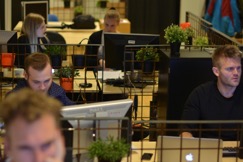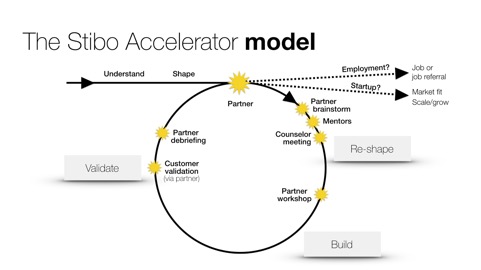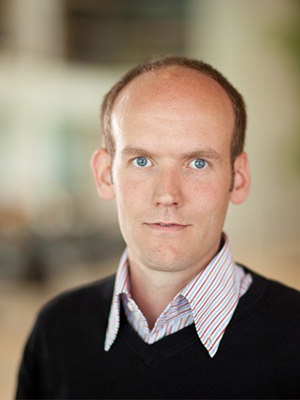Stibo Accelerator: inviting students and startups to help boost creativity and innovation
The Stibo Accelerator is founded by Stibo A/S, the owner of news industry software solution providers, CCI and Escenic. The initiative, based in Højbjerg, Denmark, is aimed at inviting talented, creative students to write their Master Thesis together with CCI/Escenic and the company’s network of partners, customers, suppliers and industry experts. The Accelerator supports the students by creating the optimal conditions for them to investigate new technologies and trends in the news industry.

What’s in it for the hosting company?
Students and startups are some of the most innovative and out-of-the-box-thinking folks around, and CCI’s staff is continuously challenged and sharpened by the new ideas the Accelerator teams bring out through their projects.
Projects so far
Since the Stibo Accelerator was launched in 2014 the initiative has graduated 22 innovation projects by 49 students from 7 different academic institutions. 2 startups have been incubated and are now self-sustaining businesses.
Examples of trends and technologies investigated
- Autonomous Drone investigative storytelling platform
- Smart Home as a news source
- Reinventing the printed product (personalization and inductive ink)
- Chat Bots for local news publishers
- Personal data as payment model for news
- Mobile “Micro Moments” for magazine publishers
- Non-news online behavior data for creating better news recommendations
- SnapChat as a news channel for 15-25 year-old
- Google Glass for news
- iBeacons for geolocation based advertising
- News on Smart Watches
- Hyper-local urban e-ink news screens
See all projects at stiboaccelerator.com
The Stibo Accelerator model
A key to all of the projects is the close collaboration with partners. This means that the projects are not run with CCI/Escenic as case partner but with the company’s customers directly. The Stibo Accelerator facilitates the connection to publishers in the CCI/Escenic network and stay on the side-line, so to speak. This makes it possible to run many projects of high quality with very little staff (1 full time employee only). Here is an illustration of the so-called “tumble dryer” model used:

Starting with project proposals
The Stibo Accelerator is open to evaluate the potential in all projects pitched by students or startups, but instead of waiting around for students to come up with their own ideas, a catalogue of ideas is sent to the partnering universities before each season begins. See the current “project proposals” here:
http://www.stiboaccelerator.com/#!project-ideas/k9k5k
(Note that the Stibo Accelerator also serves another Stibo business unit, Stibo Systems. That’s the reason for the retail related project proposals)
In the previous seasons about 75% of the projects start with one of the topics proposed. But in all cases the project proposal is just a starting point. The students take their own angle to the topic when the research begins.
Using students to infuse innovation
Regularly during the projects the students in the Accelerator are asked to participate is some form of internal meeting or staff session sharing their ideas and research findings with the CCI/Escenic staff. This way the students get valuable experience in presenting the business values in their ideas and the CCI/Escenic staff members are kept up to date with cutting edge trends and technologies. Often CCI/Escenic employees are recruited as mentors for the teams. This gives them the opportunity to discuss new business ideas directly with customers without having to only focus on “what can be delivered in the next release of the software”. It forms an inspiring creative bond between supplier and customer.
How much does it cost?
The Stibo Accelerator is run by one full-time employee. Travel and other project cost is covered for the students, so the total price for running the Accelerator using the above mentioned models is about 1.5 full-time employees. In addition to this comes the room (a spare room is used, no rent is paid) and the free lunch and coffee also included for the teams.
CONTACT POINT

Kim Svendsen, Director, Stibo Accelerator
Web: stiboaccelerator.com
Twitter: @kimsvendsen

